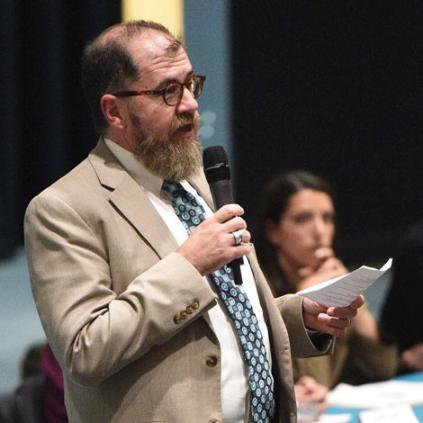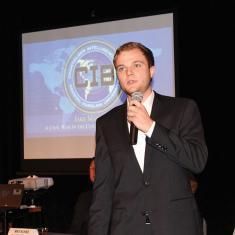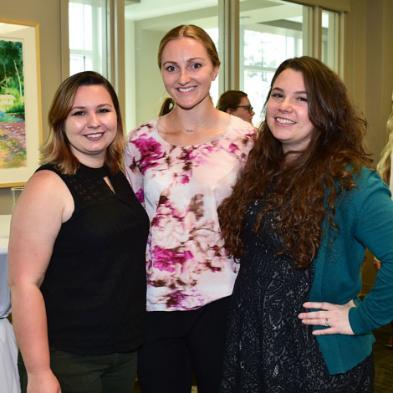The Edwards Experience
Experiential learning in the Edwards College encompasses politics, national security, and public policy.
The Complexity of Immigration
 Political confrontations have become standard in television news, and immigration is a common topic for these scenes. Sometimes, people who debate this issue lack access to historical knowledge or stories dealing with personal experiences.
Political confrontations have become standard in television news, and immigration is a common topic for these scenes. Sometimes, people who debate this issue lack access to historical knowledge or stories dealing with personal experiences.
CCU held a panel discussion on immigration from American and global perspectives in 2017, sponsored by the Department of Languages and Intercultural Studies in cooperation with the Office of International Programs and Services and the Division of Campus Life and Engagement. The panel was a diverse, interdisciplinary group of faculty and staff members offering their perspectives on the human consequences of actions related to immigration, based on historical and personal experience.
“Hearing other perspectives and lived experiences is important for the community and the campus to understand the framework of immigration and what it means to be an immigrant,” says Darla Domke-Damonte, associate provost for global initiatives and panel moderator.
Panel participants included Gary Schmidt, CCU chair and professor of languages and intercultural studies; Tripthi Pillai, CCU associate professor of English and coordinator of the Arts and Humanities Global Experiences program; Nora Fisher Onar, CCU assistant professor of politics; Jose-Luis Mireles, CCU senior instructor of languages and intercultural studies; Geoffrey Parsons, CCU director of international programs; and Till Jens Joerg Hanebuth, CCU associate professor of coastal and marine systems science.
“The experience of an immigrant is a vulnerable one,” Pillai says. “An immigrant is always saddled with multiple forms of doubt and guilt that their decision is a good and right thing to do, not simply for themselves, but to contribute to society.”
Pillai noted that the issue of immigration is timely because of the current political landscape, but the topic has been on the country’s cultural radar for some time.
“Over the decades there is an increasing disregard for hearing the story of the immigrant,” says Pillai.
Significant interest in the event prompted its move from a small room to the larger Coastal Theater in the Lib Jackson Student Union.
“I think people need to hear about the immigration process,” Mireles says, also noting that common narratives about immigrants are falsely oversimplified.
Schmidt organized the panel to combat this simplification of immigration narratives.
“In the media, there are labels of anti- and pro-, but we wanted to show details and comparisons and origins,” says Schmidt.
Schmidt hopes for future panels to continue the dialogue and focus their awareness. “It’s very easy to fall into an ‘us’ and ‘them’ mentality, and one of the things I thought was very important was to have people reflect more carefully on what their position means.”
By Chelsea Thomas
Photos by CCU Photography
Uncovering CCU’s Intelligence Community
Eight students dressed in business attire with files laid in front of them sit poised at tables on either side of the podium. Audience members file in for Coastal Carolina University’s second semesterly CentralIntelligence Brief (CIB) Symposium, and the student presenters look calm. It is apparent these students are highly prepared for their brief. The symposium was held on a Friday morning in April 2017, but the seats of the 79th Avenue Theatre in Myrtle Beach are filled with faculty, students and a large number of community patrons, many with pads to take notes.
Brief (CIB) Symposium, and the student presenters look calm. It is apparent these students are highly prepared for their brief. The symposium was held on a Friday morning in April 2017, but the seats of the 79th Avenue Theatre in Myrtle Beach are filled with faculty, students and a large number of community patrons, many with pads to take notes.
The premise of the symposium is to allow the most promising presenters in the intelligence and national security major a chance to each answer a single question on a current issues in global politics.
“The topics are timely and in the top news headlines,” says Joseph Fitsanakis, assistant professor of political science and director of the CIB. “We thought it was a pity this wasn’t being showcased to the outside world.”
The presenters included freshmen Belle Griggs and Max Kuhns; sophomore Eric Winter; junior Jake Mansfield; and seniors Julie Emory, Casey Mallon and Troy Ramsbacher. Topics ranged from “Will the U.S.-Philippine military alliance end?” to “Will ISIS be wiped out in Libya?” to “Will Cyprus come closer to reunification?”
Audience members were highly receptive to the presentations, taking notes and participating in the session.
The CIB originated as a club, but encouragement from Fitsanakis led to the symposium. He has also planned a study abroad for his students in Cyprus next year.
“The big thing that Dr. J [Fitsanakis]always stresses is experience, especially in briefing, because good briefing skills are hard to come by,” explains Winter. “That’s how the symposium was born. We need the practice before we have to do it in our careers.”
Fitsanakis speaks as highly of the CIB as they do of him: “The students wanted more beyond the classroom. They enjoy being part of this and have a very proactive attitude, so it’s no surprise the CIB features the best students in our program.”
Article and photos by Chelsea Thomas
Public Problems, Public Solutions
 Shining a light on societal challenges: It’s what Dyer Fellows do.
Shining a light on societal challenges: It’s what Dyer Fellows do.
The second annual Dyer Research Symposium, sponsored by the Edgar Dyer Institute for Leadership and Public Policy, took place in April to honor this year’s graduating class of Dyer Fellows. The Fellows made presentations on yearlong, individualized research projects involving pressing matters of public policy.
Fellows include Bethany Bebik and Celeste Benson, public health majors; Maggie Carr, intelligence and national security studies major; Rachel Houston, communication and political science major; and Ariel Lasher and Maria Karahalios, political science majors.
Bebik’s research focused on methods for promoting sexual health and safe sex on the CCU campus. Benson researched the opioid epidemic on local and national scales, including strategies for treatment and prevention. Carr studied countering violent extremism (CVE) in order to promote de-radicalization through nonviolent means. Houston researched big data analytics and its relationship to digital privacy rights. Lasher focused on Americans’ rights to safe drinking water, including related policies and case studies. Karahalios’ research centered on sustainable business practices specifically related to Conway business owners.
The symposium showcased results from the scholars’ fellowship experience that included mentorships with individual faculty members; trips to Columbia, S.C., and Washington, D.C., to learn about the policy-making process and meet with leaders in their specified areas; and creation of project-focused materials including a survey tool, a policy brief and a press release.
Carr notes that being a Fellow allowed her to not only explore her topic but also make professional insights and connections.
“Because of my Dyer experience, I was able to establish several contacts in D.C. that are well connected with the Department of Homeland Security, an establishment in which it would be a dream of mine to work,” says Carr. “Not only did the Dyer Fellowship create a better career network for me, but I now feel more prepared for future employment because of my research and my findings.”
Jacqueline Kurlowski, director of the Dyer Institute, says the Dyer Fellows gain valuable insight and skills through the experience.
“This fellowship opportunity has trained these students to not only think critically about public problems,” said Kurlowski, “but to find creative solutions that make a difference in our communities.”
To learn more about the Dyer Institue, visit coastal.edu/dyer.
By Sara Sobota
Photos by CCU Photography


